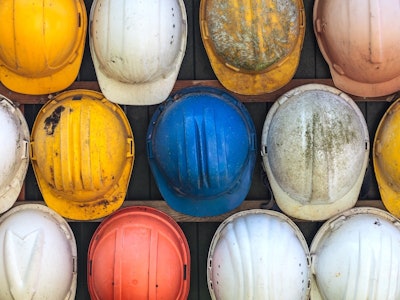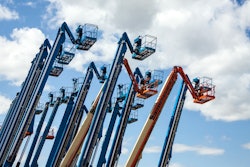
In Pennsylvania, for example, where the governor decreed projects shut down this past Saturday, health care-related construction, such as the University of Pennsylvania’s $1.5 billion Pavilion patient tower, got a pass. As reported by the Philadelphia Inquirer, the 700 union members on site will spread out to three shifts and be screened for fever.
Construction firms are seeking one magic word – essential – to keep their projects going in the wake of the coronavirus. They got it in California, when the governor’s “stay at home” order specifically excluded construction workers, and in New Jersey, where the governor declared construction work essential. And as California tries to prepare for an anticipated surge in hospital beds, Politico reports that contractors will likely be vital to the state’s response.
The Associated General Contractors of America is mounting a vigorous campaign to counter governmental shutdown orders. One factor that is especially critical to construction advocates is the federal Cybersecurity and Infrastructure Security Agency’s list of 16 critical infrastructure sectors (CISA is a division of Homeland Security). Construction is not on it, per se, although many of the industries it directly supports are.
AGC reports that 28 percent of its members, in an online survey between March 17 and 19, said an owner or a government agency had ordered them to halt or delay current construction projects. In the survey, which garnered 909 responses, 11 percent said they had been ordered by an owner or government to halt future projects.
“The industry so far has been able to keep projects going certainly much better than other industries that are voluntarily shut down or have been ordered to shut down,” AGC Chief Economist Ken Simonson said during a webinar March 20. “We also expect that more and more government agencies will be ordering projects to be halted in order to practice more social distancing even though construction work in many cases is vital; you just can’t abandon a construction site.”
One of the main reasons for construction shutdowns has been lack of supplies. In the survey, 16 percent of contractors reported a shortage of materials, equipment or parts, including PPE such as masks and respirators, Simonson said. Another 18 percent reported a shortage of government workers for approvals and inspections, and 11 percent reported a shortage of craftworkers and subcontractors. Of those surveyed, 8 percent said work had been disrupted due to information that an infected person potentially infected a jobsite.
Tom Giordano with Giordano Construction in New Castle, Pennsylvania, had received word that he could have early access to an interior demolition project at a closed ice skating rink, moving up the project timeline by about a month. “So we should have been able to get a jump on it, then the governor put out his work stoppage,” referring to Pennsylvania Gov. Tom Wolf’s order last week. “So it went from allowing us to start a phase early to then shutting us down faster than we started.”
“Most of my suppliers did shut down,” Giordano continues. “I now have a few men around for emergency work, some are laid off, and others are working for a utility company that we do a lot of work for and has to be completed now during outage work.”
In anecdotal comments made on the Awesome Earthmovers Facebook page on Sunday, U.S. group members were reporting shutdowns in Pennsylvania and Boston, as has been reported, and in some cases in Minnesota and New York.
Members located in several states – primarily in the Southeast, Midwest and West – said work was still going on, but many anticipated coming shutdowns. As some members urged caution, others expressed disdain for construction shutdowns. As one member put it, “It’s going to be hard to catch anything inside a cab.”
Construction accelerates in some areas
As schools and businesses shut down, contractors also report taking advantage of sudden vacancies in buildings and on roads to get work done. On Saturday, the Colorado Department of Transportation said roadwork in the state would continue. “We’re actually checking to see if reduced daytime traffic will allow us to do daytime paving in spots where we couldn’t normally do it this time of year,” said CDOT spokesperson Matt Inzeo in an email to Colorado Public Radio.
Although not indicative of overall trends, the Iowa Department of Transportation said it was beginning construction on March 16th to reconstruct the northbound lanes of U.S. 218 in Waterloo, Iowa. And on Friday, the Minnesota Department of Transportation said it would start work on Highway 10 through Wadena on March 30th, and it has not delayed or halted road construction projects.
The Florida Department of Transportation, which has not stopped road construction, is allowing 32 projects to go to 12-hour lane closures due to low traffic to speed up roadwork.
Contracts due to start this spring – the prime time for construction starts particularly in northern states as winter begins to wane – are still in question.
Simonson expects the supply chain for construction to continue to slow down, especially as other countries deal with their own outbreaks. But he also notes that materials costs should also drop, with lower oil prices and lower global demand for copper, steel and aluminum.
And demand is increasing for some types of construction.
“We have had a few cases for orders of additional construction, mostly in the nature of hospitals, shelters, treatment facilities, screening facilities and also increasing the capacity of manufacturers,” Simonson said.
Long-term effects on construction
The longer-term prospects for the construction industry are less certain, but Simonson predicts a slower recovery.
“Once (current) construction projects finish up, I think it will be a long time before many owners decide they have the confidence or the financial wherewithal to resume construction,” he said.
“Construction is keeping going better than other industries for now, but it’s likely to have a much slower recovery.”
He also predicts cutbacks in public budgets for projects other than those associated with the virus. Some construction companies will shut down due to reduced work and cash-flow problems, and there will possibly be less demand for projects such as office buildings, hotels and large sports and entertainment facilities, he said.
Don McLoud of Equipment World contributed to this report.










